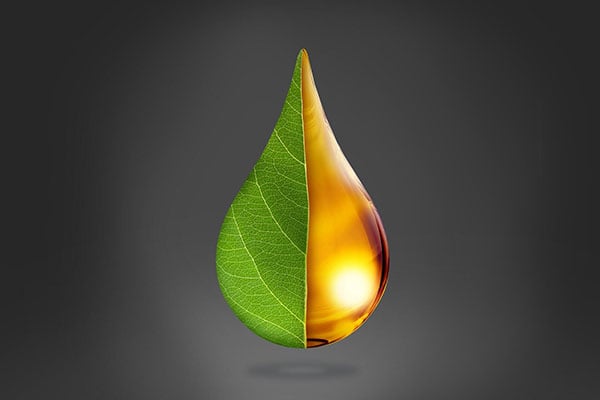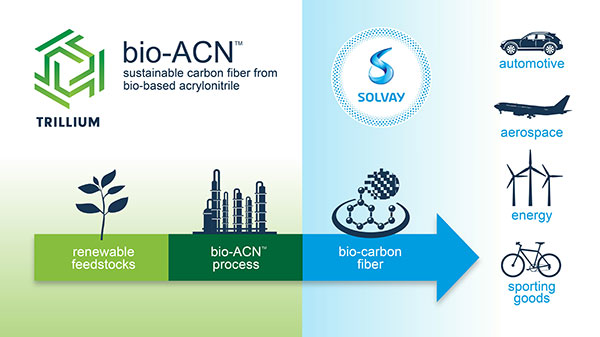Plastics processors and brand owners are keen to reduce the carbon footprint of their products and have various tools at their disposal to attempt to do so. One increasingly popular approach involves finding ways to substitute bio-based materials for the fossil-derived resins they have been using for decades.
Companies such as Covestro, SABIC, Borealis, UBQ Materials, Asahi Kasei, Solvay and Toray Industries are among those finding alternative feedstock options for materials such as polycarbonate, polypropylene, acrylonitrile (used in the production of ABS resin and other products), and nylon fiber.
A ‘climate-neutral’ polycarbonate

Covestro AG recently introduced what it calls “the world’s first climate-neutral polycarbonate” from its Uerdingen site in Germany. The materials giant showcased these Makrolon® RE-brand polycarbonate (PC) materials at the CES 2022 consumer technology show in Las Vegas in early January. These grades are climate-neutral from cradle to gate and have gained the International Sustainability and Carbon Certification Plus (ISCC+) designation.
Covestro says these grades are up to 72% mass-balanced attributed bio-circular in content. The company attributes these environmental attributes to its use of renewable electricity for Covestro production processes and the introduction of raw materials coming from mass-balanced bio-waste and residues that do not compete with existing food sources.
The firm noted it has tested a breadth of polycarbonate formulations made with up to 50% of recycled content and beyond. The end result tended to be an unacceptable reduction in performance properties and colorability while also costing more than strictly virgin resins. Instead, Covestro has opted to use, in part, renewable feedstocks, as well as renewable (wind) energy to power production of Makrolon RE. Using this approach has resulted in a reduction of carbon footprint to almost zero, Covestro notes, while still yielding virgin-quality PC resin with no impact on end properties or processability.
Additionally, Covestro has now extended “RE” to its Bayblend® line of PC/ABS blends.
A bio-based PC copolymer

Saudi Arabia-based SABIC, meanwhile, in late January introduced its first bio-based PC copolymer to help advance the consumer electronics industry’s net-zero carbon emissions goals. Called LNP™ Elcrin™ EXL7414B, it is the first grade in the firm’s expanding portfolio to secure the ISCC+ designation. SABIC notes the resin is formulated with more than 50% bio-based content from waste materials, which do not compete with the food chain, according to the mass balance approach.
A preliminary SABIC internal assessment indicates that each kilogram of the new bio-based resin provides two kilograms of CO2 reduction as compared to the fossil-based alternative.
The Chinese electronics brand called realme is using the new copolymer for the battery cover of its new GT 2 Pro smartphone that launched on Jan. 4 in China.
Polypropylene joins the party
Vienna-based polyolefins producer Borealis AG has launched a specially modified, transparent, high-gloss, bio-based polypropylene (PP) random copolymer based on renewable feedstock using the mass-balance method (ISCC+ certified). Called Bornewables™ RF365MO, it is made using sustainably sourced renewable feedstocks, derived solely from waste and residue vegetable oils such as used cooking oil, and residues from vegetable oil processing. This grade is designed for high-speed injection molding and is specifically suitable for closures, thin-wall containers and bottles.
Israeli cleantech company UBQ Materials has introduced another type of PP-based compound that contains its unique additive called UBQ™. This additive is made from household waste (at least 50% bio-based, such as food residues, cardboard, paper) as well as post-consumer plastics. This compound consists of 20% UBQ and 80% PP. The additive significantly reduces greenhouse gases and is said to prevent 11.7 times its weight in CO₂ equivalent emissions.
Acrylonitrile goes bio, as well

Tokyo-based Asahi Kasei Corp., meanwhile, says its South Korean subsidiary Tongsuh Petrochemical Corp. Ltd. has acquired ISCC+ certification for its acrylonitrile (ACN) as a sustainable product and plans to begin production of ACN using biomass propylene in February 2022. ACN is used as a raw material to make ABS resin, acrylamide, acrylic fiber and various other chemical products. It is also used to produce polyacrylonitrile (PAN), the precursor of carbon fiber.
Belgium’s Solvay Group is making strides in this area, as well, and in January, signed a letter of intent with Tennessee-based Trillium Renewable Chemicals to develop the supply chain for bio-based acrylonitrile (bio-ACN). Trillium says it will supply Solvay with bio-ACN, and Solvay will evaluate the material for carbon fiber manufacturing as part of its long-term commitment to developing sustainable solutions from bio-based or recycled sources. The aim of this partnership, the firms say, is to produce carbon fiber for use in various applications such as aerospace, automotive, energy and consumer goods.
Acrylonitrile is a chemical intermediate typically made from petroleum-based feedstocks such as propylene and is the primary raw material used in the production of carbon fiber. Trillium’s Bio-ACN™ process delivers acrylonitrile from plant-based feedstocks like glycerol with a lower carbon footprint.
Plant-based nylon fiber

On the textiles front, Tokyo-based Toray Industries has developed a nylon 510 (N510) fiber that incorporates 100 percent bio-based synthetic polymer content. The grade, Ecodear N510, will be the first entirely plant-based nylon fiber in Toray’s Ecodear product line. The company says that, unlike other wholly plant-based nylons, this new grade is as strong and heat resistant as nylon 6, while offering outstanding dimensional stability and a high melting point.
It’s clear that multiple approaches will be needed to yield a more sustainable, environmentally friendly portfolio of polymer products going forward. These are just a few of those making great strides already to make that happen.
Find biopolymers for your next project using Prospector’s advanced biopolymer specialty search filter. Learn more!
The views, opinions and technical analyses presented here are those of the author or advertiser, and are not necessarily those of ULProspector.com or UL Solutions. The appearance of this content in the UL Prospector Knowledge Center does not constitute an endorsement by UL Solutions or its affiliates.
All content is subject to copyright and may not be reproduced without prior authorization from UL Solutions or the content author.
The content has been made available for informational and educational purposes only. While the editors of this site may verify the accuracy of its content from time to time, we assume no responsibility for errors made by the author, editorial staff or any other contributor.
UL Solutions does not make any representations or warranties with respect to the accuracy, applicability, fitness or completeness of the content. UL Solutions does not warrant the performance, effectiveness or applicability of sites listed or linked to in any content.


